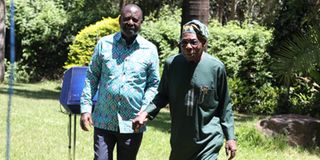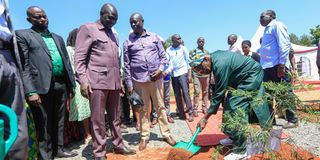
Azimio la Umoja leader Raila Odinga with former Nigerian President Olusegun Obasanjo in Nairobi on February 15, 2024 when he formally declared interest in the African Union Commission chairmanship.
Raila Odinga’s public expression of interest to head the African Union Commission, on Thursday, in the presence of former Nigerian president Olusegun Obasanjo, has delighted both his opponents and supporters in equal measure.
Different reasons
It is for different reasons.
The announcement was swiftly endorsed by Edwin Sifuna, his party Secretary-General, and all his Azimio coalition co-principals led by Stephen Kalonzo Musyoka.

Former Nigerian President Olusegun Obasanjo plant a tree while President William Ruto and Deputy President Rigathi Gachagua look on on February 15 2024.
Although president William Ruto has not publicly pronounced himself on the matter, his Principal Secretary in the Ministry of Foreign and Diaspora Affairs, Dr Korir Sing’oei, has offered to endorse and facilitate Raila’s candidature.
Better candidate
Among the accolades poured by Kenya Kwanza notables include a reference to Raila as “a well-deserving (Kenyan) national,” and “a wonderful soul.” Millicent Omanga, “enthusiastically” added that Raila was “a better candidate for the job” who “ticks all the boxes.” These effervescent acclamations are radiating as if Raila’s “win” is a fait accompli.
But are these exuberant accolades well-meaning or tongue-in-cheek? Is the bid a walk in the park as it is meant to sound? The cheerleaders for Raila’s AU position bid are evading these and other tough questions: What interests and benefits will accrue to Kenya when its national holds this position?
Is Kenya willing to spend colossal resources, energy, and time required to install its national in this position? Will the AU really be Raila’s retirement home? Is Raila being consigned to “retirement” in Addis Ababa instead of Bondo, as President Ruto had promised during the presidential campaigns in 2022?
Who stands to benefit?
Who stands to benefit most from and least in Raila’s retirement as the doyen of Kenyan opposition? Is Raila the right and best person for this position? Is Ruto using the AU to neutralise domestic challenges to his regime and blunt the opposition?
This is not the first time a Kenyan is vying for this position. In 2017, then-foreign affairs cabinet secretary Amina Mohamed made a strong run for the position and came very close to replacing outgoing chairperson Ngosazana Dlamini-Zuma.
There were many useful lessons the government can draw from if it is fully committed to capturing the position this time around. But a win of the position per se will not answer some of the above questions. Although not posed as rhetorical questions, I will not attempt to answer each of them.
Political exile
Raila will not be the first political leader to be banished to political exile in Addis Ababa.
When Gabon offered its then Foreign Affairs Minister Jean Ping the AUC chairperson position, it was widely acknowledged that President Ali Bongo was neutralising a potential rival by dispatching him to Addis Ababa.
Likewise, it was widely held that Nkosazana Dlamini-Zuma was shipped to the AU to check her ambitions for the South Africa presidency, then held by her former husband, Jacob Zuma. Interestingly, these “political exiles” did not eclipse the ambitions of either Ping or Dlamini-Zuma as they kept keen attention on the domestic politics of their countries.
Platform to build political profiles
They both returned home after serving their first terms to unsuccessfully vie for the highest offices. Both were also criticized for using the AU as a platform on which they built their political profiles to run for presidential elections.
Bowed out of the presidential race?
While Ping and Dlamini-Zuma returned and vied for leadership positions in their countries, Raila will have to resign before the end of his first term in 2028. But if he serves for one term and returns to run for 2032, he will be 88 years old. Undoubtedly, by offering himself as the sixth chairperson of the AU Commission, Raila has essentially bowed out of the race to be the sixth president of the Republic of Kenya.
The ramifications of Raila quitting Kenyan politics are earth-shaking and could open many doors. Besides breathing the deepest sigh of relief if Raila exists from the Kenyan political scene, President Ruto will certainly be the main beneficiary.
He will be presented with a golden opportunity to silence his most virulent and outspoken detractor and disable the staidest political foe in his 2027 re-election bid.
Raila’s sojourn in Addis Ababa will also open the door for a young generation to assume the leadership of the opposition wing. All will be watching with bated breath who among former Mombasa governor Hassan Joho, former Kakamega governor Wycliffe Oparanya, ODM secretary-general Edwin Sifuna, Embakasi East MP Babu Owino, and other young leaders in ODM will step up to the plate.
Others expected to emerge out of Raila’s political shadows are Wiper leader Stephen Musyoka, former cabinet ministers Eugene Wamalwa and Martha Karua, and Peter Munya. But can any of these understudies fit into Raila’s gargantuan shoes?
To fulfill his next ambition, Raila must pay a hefty price. To receive full government backing he must publicly endorse and recognise Ruto presidency, drop all court cases against the government, silence criticism from his camp of the government, and accept other conditions such as supporting the policies of the current administration.
Obliterate the opposition
In a nutshell, Raila must shake hands with Ruto. This “handshake” could be the opposition’s poisoned chalice as it could spell the demise of the opposition, which has become synonymous with Raila. It is not clear if Raila has a transition plan to seamlessly hand over the opposition mantle. But there is genuine fear that Ruto could apply Machiavellian tactics to obliterate the opposition in order to clear the way for full implementation of his agenda.
Getting picked up to head the AUC is not a walk in the park. Raila will be the second person Kenya will be fronting as a candidate for one of the most challenging positions on the continent. There are many useful lessons that can be drawn from Amina Mohamed’s bid in 2017. For instance, the government should devote a hefty kitty to bankroll diplomatic shuttling that includes smoothening relations with our neighbours and bringing them all on board. Kenya must also reach out and secure full commitments of all regional anchors such as Nigeria and South Africa.
When the AU Assembly faced a stalemate in January 2012 election of the Commission head, it established an Ad Hoc Committee of Eight to resolve the impasse. The Committee recommended that the Presidents of South Africa and Gabon reach a compromise such as withdrawing their candidates.
Subsequently, the tide turned in favour of Dlamini-Zuma when South Africa scored a huge diplomatic coup by securing the backing of Nigeria. Besides the rivalry between the two African powerhouses, Nigeria was concerned that South Africa was in violation of the gentleman’s agreement between the “Big Five” (which also included Egypt, Algeria and Libya) to reserve that position for small states.
Breathtaking 50 trips
In view of the existing tense relations with its neighbours, Kenya must massively invest in regional and continental diplomacy. Since coming to power, Ruto has concentrated on wooing western and Asian countries to invest in the country. Out of the breath-taking 50 foreign trips he has undertaken since assuming power in September 2022, 15 have been to African countries including visiting Uganda and Tanzania four times each, Ethiopia three times, Burundi, DRC and Congo two times and to 9 other African countries once. These trips took him to one west and north African countries (Senegal and Egypt) each. He has also been to six Francophone countries, mostly in Central Africa region, only one to a Lusophone country and to three southern Africa countries.
The next AU chairperson will face a mission impossible of stemming resurgence of national sovereignty that is obliterating the spirit of Pan-Africanism and stunting implementation AU Agenda 2063 flagship projects. Most African leaders are only giving the AU lukewarm support and lip service in implementation of its ambitious agendas.
While not meeting their commitments to pay membership dues, AU member states are unwilling to implement their own recommendations to make the organisation financially independent. Another alarming behaviour is that of disregarding the organisation’s key policies, decisions and legal instruments. Most African leaders nowadays give AU meetings wide berths while making beelines for foreign capitals for photo ops with their hosts.
AUC is beleaguered by overall poor leadership and allegations of corruption and personnel mismanagement, including nepotism, cronyism, and sexual and other forms of harassment. Regrettably, the current AUC chairperson has sat on all reports recommending measures to address these maladies. This has seriously demoralised the staff and dented the image of the AU as a promoter of good governance and protector of human rights in Africa.
The AU weaknesses and failures to tackle these challenges have raised a myriad of questions about its effectiveness and viability in this era when multilateral organisations are struggling to justify their raison d'être. Will Raila or the next AU Commission head have the energy, passion and chutzpah to discharge the primary responsibility of righting the many wrongs within the organisation and ensuring the efficient and smooth running of the commission to address Africa’s development, peace, security and governance challenges?
- Prof Wafula Okumu is a former AU staffer and author of several publications on the African Union including, ‘The African Union at 20, African Perspectives on Progress, Challenges and Prospects.’ [email protected]






